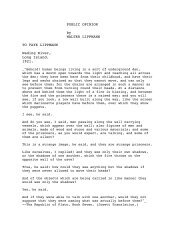Tacit Knowing: Its Bearing on Some Problems of Philosophy
Tacit Knowing: Its Bearing on Some Problems of Philosophy
Tacit Knowing: Its Bearing on Some Problems of Philosophy
You also want an ePaper? Increase the reach of your titles
YUMPU automatically turns print PDFs into web optimized ePapers that Google loves.
Michael Polanyi http://faculty.uml.edu/rinnis/45.301%20Ways%20<strong>of</strong>%20Knowi...<br />
<strong>of</strong> these parameters within the nervous system.<br />
However, it will be simpler, and involve no loss <strong>of</strong><br />
generality, if I set out the Laplacean visi<strong>on</strong> in terms <strong>of</strong> its original<br />
model <strong>of</strong> primary qualities c<strong>on</strong>sisting <strong>of</strong> the masses, positi<strong>on</strong>s,<br />
velocities, and forces <strong>of</strong> ultimate particles. Laplace declared that<br />
the predicti<strong>on</strong> <strong>of</strong> this c<strong>on</strong>figurati<strong>on</strong> for the universe would supply<br />
us with a knowledge <strong>of</strong> “all things to come.” It was always<br />
agreed that we were technically incapable <strong>of</strong> establishing the<br />
initial c<strong>on</strong>figurati<strong>on</strong> <strong>on</strong> which to base such calculati<strong>on</strong>s and that<br />
we could not possibly carry out these calculati<strong>on</strong>s even if we<br />
knew the original c<strong>on</strong>figurati<strong>on</strong>. But it has never been doubted<br />
that if we were presented with the complete atomic c<strong>on</strong>figurati<strong>on</strong><br />
<strong>of</strong> the universe at any moment, we would know about it<br />
everything that we might c<strong>on</strong>ceivably want to know. This is what<br />
I shall c<strong>on</strong>test here.<br />
The law <strong>of</strong> irreversibly increasing entropy governs the<br />
fundamental processes <strong>of</strong> equilibriati<strong>on</strong> in nature. But the entropy<br />
<strong>of</strong> a system cannot be computed from a knowledge <strong>of</strong> its atomic<br />
c<strong>on</strong>figurati<strong>on</strong>, for it is measured by the extent to which this<br />
c<strong>on</strong>figurati<strong>on</strong> is uncertain. This argument can be made more<br />
definite by assuming quantizati<strong>on</strong>. The entropy <strong>of</strong> a precisely<br />
known atomic c<strong>on</strong>figurati<strong>on</strong> is, then, zero and remains zero<br />
throughout the future; equilibriati<strong>on</strong> by increasing entropy does<br />
not take place. We can have equilibriati<strong>on</strong> <strong>on</strong>ly if we introduce<br />
c<strong>on</strong>cepti<strong>on</strong>s <strong>of</strong> probability, by assuming that the c<strong>on</strong>figurati<strong>on</strong> <strong>of</strong><br />
atoms is to a c<strong>on</strong>siderable extent uncertain.<br />
We meet with the same kind <strong>of</strong> situati<strong>on</strong> wherever we<br />
assess chances. If, in throwing dice, we know the exact physical<br />
particulars <strong>of</strong> our throws and hence could predict their outcome,<br />
the probability <strong>of</strong> any particular sides <strong>of</strong> the dice turning up<br />
would be inc<strong>on</strong>ceivable, and no acti<strong>on</strong>s based <strong>on</strong> such<br />
probabilities (e.g., betting) could be justified. Even so in physics,<br />
if all atomic particulars were specified, processes governed by<br />
probabilities, e.g., irreversible equilibriati<strong>on</strong>s, would be<br />
inc<strong>on</strong>ceivable and their actual occurrence could not be accounted<br />
for. We may regard, therefore, such processes as comprehensive<br />
features, which disappear when their particulars are specified in<br />
terms <strong>of</strong> a Laplacean topography.<br />
This illustrates the logical deficiency <strong>of</strong> the Laplacean<br />
c<strong>on</strong>cepti<strong>on</strong> <strong>of</strong> universal knowledge at an elementary level. It<br />
faces us, more generally, in the fact that questi<strong>on</strong>s in which we are<br />
interested arise in the c<strong>on</strong>text <strong>of</strong> experiences which do not c<strong>on</strong>sist<br />
in atomic c<strong>on</strong>figurati<strong>on</strong>s, and which may not be derivable from<br />
the c<strong>on</strong>ceptual framework <strong>of</strong> atomic c<strong>on</strong>figurati<strong>on</strong>s.<br />
Let me illustrate this further by the example <strong>of</strong> machines.<br />
Machines are solid structures made up <strong>of</strong> several parts, which<br />
have their several functi<strong>on</strong>s in the operati<strong>on</strong> <strong>of</strong> the machine. Thus<br />
a machine can be described as a particular c<strong>on</strong>figurati<strong>on</strong> <strong>of</strong> solids.<br />
The descripti<strong>on</strong> would state the materials and shapes <strong>of</strong> the parts,<br />
and the boundary c<strong>on</strong>diti<strong>on</strong>s by which they are joined together as<br />
a system. But this could describe <strong>on</strong>ly <strong>on</strong>e particular specimen <strong>of</strong><br />
<strong>on</strong>e kind <strong>of</strong> machine. It could not characterize a class <strong>of</strong><br />
machines <strong>of</strong> the same kind, which would include specimens <strong>of</strong><br />
different sizes, <strong>of</strong>ten <strong>of</strong> different materials, and with an infinite<br />
22 <strong>of</strong> 27 1/26/10 9:36 AM





